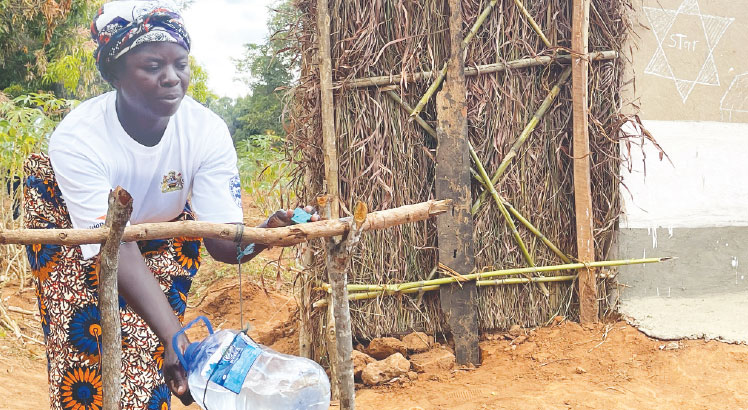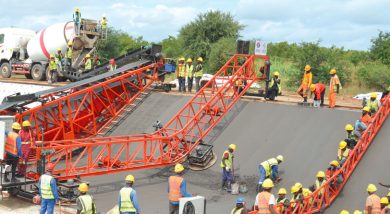Simple toilets change lives
In Nkhata Bay along the picturesque shores of Lake Malawi, toilets made of local materials are visibly changing villagers’ lives.
Entering the territory of village head Imana Kamuning’a, nestled between the lake and vast rubber plantations, there is a simple toilet with candid chalk messages: “Dig your own toilet, please. Don’t abuse this one. For [our] family only.”
Explains Lucy Manda, a mother of three: “My son wrote this to constantly remind us of where we are coming from. We were in a pretty dark place in terms of sanitation and hygiene.”
Villagers in her area primarily rely on fishing and agriculture.
However, basic amenities, including safe water, sanitation and hygiene have been scarce.
Lacking toilets, the villagers defaecated in the open, contaminating the environment and increasing the risk of sanitation-related diseases, including cholera.

Waterborne diseases were rife, particularly among children and the elderly.
“My family and I used to defaecate in the nearby bush,” recalls Manda. “During the rainy season, our area was hit hard by cholera, but we had ourselves to blame because we had created an unhygienic environment.”
The life-saving toilets are part of a project implemented by the Northern Region Water Board (NRWB) in partnership with Nkhata Bay District Council to tackle the deadly sanitation and hygiene challenges.
With funding from the African Development Bank (AfDB) under the Nkhata Bay Town Water Supply and Sanitation Project, NRWB supported the Community-led Total Sanitation (CLTS) approach to tackle open defaecation and its life-threatening impacts.
According to NRWB director of infrastructure development Catherine Mwafulirwa, the initiative reached about 23 000 community members with sanitation and hygiene promotion messages, including behavioural change to improve health,
As toilets emerged in the village, open defaecation and waterborne diseases significantly declined.
Meanwhile, improved sanitation and hygiene created healthy communities, allowing healthy children to spend time in school instead of being stuck to sickbeds. Even adults now concentrate on productive activities to improve their livelihoods.
The toilets made of locally sourced bricks, wood, mud and thatch are easy to build and maintain.
Each family proudly constructed its own, fostering a sense of ownership.
“We now have proper toilets both in the homes and at school. This has improved our learning environment unlike in the past when we could not come to school due to lack of proper sanitation facilities,” says Leah Banda, 14, a Standard Seven learner at Kafunda Primary School.
Nkhata Bay district environmental health officer Mathews Kalaya says the intervention has reduced waterborne diseases in the district frequently haunted by cholera.
He thanks AfDB for supporting the sanitation and hygiene intervention in cholera hotspots under Mndola and Mankhambira.
“The communities which were previously cholera hotspots recorded zero cases in 2023. The outbreak mostly affected areas in the same district without the CLTS intervention,” Kalaya said.
From 2022 to 2023, Nkhata Bay was among the hardest-hit districts in Malawi’s deadliest cholera epidemic.
The district recorded 44 deaths from 1 625 patients.
Since December 2022, the target community has constructed 4 432 improved latrines through community-led sanitation interventions, up from 1 280.
Kalaya is pleased that every household in the area constructed a latrine with a strong roof, resilient walls, an impermeable floor with a drop hole cover and a hand washing facility.
“Now there is no trace of open defaecation in the village. This is why the areas have attained open defaecation-free status,” he explains.
Manda is delighted that the safe and private facilities for personal hygiene have brought a shift in the shoreline community’s social dynamics and self-respect.
“Now we are very free and happy people,” she says, smiling. “Apart from improving sanitation and hygiene, these toilets have restored our dignity and privacy.”
The humble toilets in Nkhata Bay give a glimpse of the power of simple local solutions to uplift the health of rural communities at risk of being left behind in the fight against preventable diseases that make them poorer.
Addressing their basic sanitation needs can profoundly impact health, education, and the overall quality of life.
“The simple toilets are a symbol of hope and progress towards a healthier and more prosperous future for our community,” says Traditional Authority Mankhambira.
The environment is benefiting as well, according to the chief.
“Eradicating open defaecation guarantees us cleaner surroundings and safe water,” he states, waving goodbye to water and air pollution once common in his area.





